 |
Berlin (UPI) Mar 21, 2011 Germany, which has decided to temporarily shut down its seven oldest nuclear power reactors, is debating whether it's realistic to completely phase out nuclear energy anytime soon. Greenpeace has done it again. "The lying continues," read the words shown with the image of a skull that the environmental organization projected onto the hull of eight German reactors in the early hours Monday. Greenpeace said it wanted to protest the government's decision to test all 17 reactors for their safety over the next three months, arguing that thorough safety checks required much more time. German Chancellor Angela Merkel's decision to shut down seven reactors built before 1980 for at least three months was but a mere tactical maneuver to win her votes in upcoming regional elections, said Mathias Edler, a Greenpeace nuclear power expert. "We need to phase out nuclear power as quickly as possible," Edler said. Doing so won't be easy. Merkel's most recent move is an astonishing policy turnaround. Some six months ago, she agreed to extend the running times of Germany's 17 reactors by an average of 12 years until renewables are ready to take over. Nuclear power, the Merkel government argued at the time, is stable, cheap and carbon dioxide-free. Her latest decision, announced as a response to the Japanese reactor crisis, could forever ground some, if not all of the seven reactors currently off the grid. The German Environment Ministry, news magazine Der Spiegel reports in its latest edition, is already evaluating the money and time needed for such a quicker phase out. It's already clear that it would be a daring move. It will do away with some of the additional tax income Berlin had banked on in return for longer reactor running times. There might be more financial damage if the utilities decide to go to court over reactor closures. Yet it's more than just money. Germany's nuclear power reactors, with a total capacity of nearly 21,500 megawatts, account for roughly one-fifth of the country's electricity needs. Johannes Teyssen, the head of Eon, Germany's largest utility and a nuclear power plant operator, said the decision to shut down seven reactors would put pressure on the aging German power grid. "Measures that go even further couldn't be handled at all," he told Der Spiegel. Critics say Teyssen and his colleagues, eager to get their nuclear cash cows back online, are stoking fears that are overblown. Instead of giving nuclear a lifeline, Germany should push the development of renewable energy sources -- wind, solar and biomass -- even stronger, they say. Yet even renewables require massive investments in new networks. Germany needs to spend at least $13 billion to build around 2,240 miles of new transmission lines to integrate the fluctuating renewable electricity sources, public German energy think tank Dena said in November. The ever-growing wind farms in the northern German states and along the North and Baltic Sea coastlines require new power lines to bring the power to German industrial centers in the west and south, the think tank says. But as for now, things aren't changing quickly enough. Grid expansion in Germany has been slow and tedious, with massive public opposition to new high-voltage transmission lines. In 2005 Dena urged the government to build some 530 miles of new infrastructure but less than 60 miles have actually been built. The public opposition has also undermined plans to modernize the country's power plant portfolio. Several modern coal and natural gas-fired power plants, more efficient than their aging counterparts in operation, weren't built because of public opposition. Yet if nuclear is to be phased out and as older plants come offline, it's clear that Germany, besides boosting its energy efficiency campaign, needs several new gas-fired power plants, observers say. It can't possibly rely on coal if it wants to reach its climate protection targets.
Share This Article With Planet Earth
Related Links Nuclear Power News - Nuclear Science, Nuclear Technology Powering The World in the 21st Century at Energy-Daily.com
 ASEAN 'more cautious after Japan nuclear crisis'
ASEAN 'more cautious after Japan nuclear crisis'Singapore (AFP) March 21, 2011 Japan's nuclear crisis is likely to prompt Southeast Asian states to look more carefully at their plans to tap atomic energy for power generation, the head of the regional bloc said Monday. Association of Southeast Asian Nations (ASEAN) secretary-general Surin Pitsuwan said Japan's struggle to prevent a reactor meltdown at the Fukushima nuclear power plant will have a "psychological" impact ... read more |
|
| The content herein, unless otherwise known to be public domain, are Copyright 1995-2010 - SpaceDaily. AFP and UPI Wire Stories are copyright Agence France-Presse and United Press International. ESA Portal Reports are copyright European Space Agency. All NASA sourced material is public domain. Additional copyrights may apply in whole or part to other bona fide parties. Advertising does not imply endorsement,agreement or approval of any opinions, statements or information provided by SpaceDaily on any Web page published or hosted by SpaceDaily. Privacy Statement |